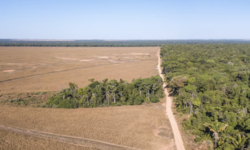Insurance Business | 21 November 2023
Swiss Re alleged to have insured illegally deforested farmland in Brazil
By Abigail Adriatico
Swiss Re, an insurance group based in Zurich, was found to have taken out at least 19 policies from 2016 to 2022 for large farms that have been proven by authorities to have undergone illegal deforestation, according to Public Eye, a non-government organisation concerned with sustainability.
The investigative organization Repórter Brazil released a report which alleges that Swiss Re profited from insurance policies made on these illegally deforested lands in Brazil. From the data it gathered, it was found that Swiss Re was ranked fourth in the previous year for agricultural contracts that were concluded as part of a state subsidy program.
The total area that was insured by the program was 659,000 hectares. This included Manto Verde, a 2,400-hectare farm, on which the (re)insurance group had taken out 17 insurance policies since 2016. However, Manto Verde had long been declared a restricted area by the authorities due to illegal deforestation.
Repórter Brazil had also documented cases where Swiss Re had concluded insurance contracts with farms that illegally cultivated indigenous protected areas and used armed violence, with one client being a defendant in a murder case when he took out three insurance policies. Another client was under investigation for allegedly using slave labour on his coffee farm.
Swiss Re’s sustainability report in the previous year mentioned that the group aimed to neutralize its greenhouse gas emissions by 2050. However, Observatório do Clima stated that Swiss Re had ignored climate policy responsibility in its transactions in Brazil, as the country had gross emissions from deforestation in 2021 that exceeded those of a country like Japan.
Repórter Brazil’s research was financed by the Investigation Award, a grant by the Public Eye that aimed to support media professionals and NGOs in investigating the activities of Swiss companies in developing countries and what they may entail when it comes to human rights violations, environmental damage, or financial crimes.
The report was prepared by André Campos, Naira Hofmeister, Gil Alessi, France Júnior, Ruy Sposati, Carolina Motoki and Bruna Bronoski.













